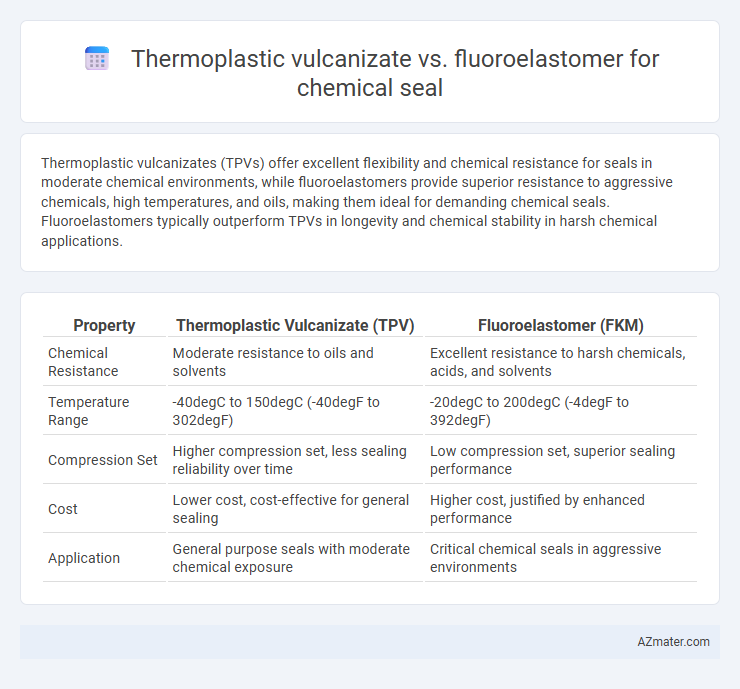Thermoplastic vulcanizates (TPVs) offer excellent flexibility and chemical resistance for seals in moderate chemical environments, while fluoroelastomers provide superior resistance to aggressive chemicals, high temperatures, and oils, making them ideal for demanding chemical seals. Fluoroelastomers typically outperform TPVs in longevity and chemical stability in harsh chemical applications.
Table of Comparison
| Property | Thermoplastic Vulcanizate (TPV) | Fluoroelastomer (FKM) |
|---|---|---|
| Chemical Resistance | Moderate resistance to oils and solvents | Excellent resistance to harsh chemicals, acids, and solvents |
| Temperature Range | -40degC to 150degC (-40degF to 302degF) | -20degC to 200degC (-4degF to 392degF) |
| Compression Set | Higher compression set, less sealing reliability over time | Low compression set, superior sealing performance |
| Cost | Lower cost, cost-effective for general sealing | Higher cost, justified by enhanced performance |
| Application | General purpose seals with moderate chemical exposure | Critical chemical seals in aggressive environments |
Introduction to Chemical Seals: Material Selection Matters
Thermoplastic vulcanizates (TPVs) offer flexibility, excellent chemical resistance, and cost-effective solutions for seals exposed to moderate solvents and oils, making them suitable for diverse chemical seal applications. Fluoroelastomers (FKMs) provide superior resistance to aggressive chemicals, high temperatures, and harsh environments, ensuring durability and reliability in critical sealing scenarios involving fuels, acids, and hydrocarbons. Selecting the appropriate material hinges on chemical compatibility, temperature range, and mechanical stress, directly impacting the seal's performance and lifespan in industrial operations.
Thermoplastic Vulcanizate (TPV): Properties and Applications
Thermoplastic vulcanizate (TPV) offers exceptional chemical resistance, flexibility, and durability, making it ideal for chemical seals exposed to aggressive environments. TPV's unique blend of rubber elasticity and thermoplastic processability enables precise molding and superior sealing performance in automotive, industrial, and consumer applications. Its resistance to acids, alkalis, and various solvents ensures long-lasting integrity and reliability in demanding chemical sealing systems.
Fluoroelastomer (FKM): Characteristics and Industrial Uses
Fluoroelastomer (FKM) offers superior chemical resistance, particularly against harsh acids, hydrocarbons, and high-temperature fluids, making it ideal for chemical seals in aggressive environments. Its excellent thermal stability (typically up to 200-250degC) and resistance to compression set ensure long-lasting performance in industrial applications such as automotive fuel systems, aerospace fuel lines, and chemical processing equipment. Compared to thermoplastic vulcanizates, FKM provides enhanced durability in demanding conditions where aggressive chemicals and elevated temperatures are present.
Chemical Resistance: TPV vs Fluoroelastomer
Fluoroelastomers exhibit superior chemical resistance compared to Thermoplastic Vulcanizates (TPVs), particularly against aggressive chemicals such as acids, fuels, and solvents, making them ideal for demanding chemical seal applications. TPVs offer good resistance to a range of chemicals but tend to degrade faster when exposed to high temperatures or harsh solvents, limiting their use in extreme environments. Selecting fluoroelastomers ensures enhanced durability and longevity of chemical seals in applications requiring robust resistance to oils, hydrocarbons, and corrosive agents.
Temperature Performance Comparison
Thermoplastic vulcanizates (TPVs) exhibit excellent flexibility and chemical resistance with temperature tolerance typically ranging from -40degC to 150degC, making them suitable for moderate thermal environments in chemical sealing applications. Fluoroelastomers (FKM), renowned for their superior heat resistance, maintain integrity and sealing performance at extreme temperatures from -25degC up to 200degC or higher, proving more reliable in high-temperature chemical exposure. Selecting fluoroelastomers over TPVs enhances durability and safety in seals subjected to aggressive chemicals and elevated temperatures, critical in industries such as automotive and aerospace.
Mechanical Strength and Flexibility
Thermoplastic vulcanizates (TPVs) offer superior flexibility and excellent mechanical strength, making them highly suitable for dynamic chemical seals where movement and resilience are critical. Fluoroelastomers (FKM) provide exceptional chemical resistance and high temperature tolerance but generally exhibit lower flexibility compared to TPVs, which can limit their use in applications requiring frequent flexing or deformation. Selecting between TPV and FKM for chemical seals depends on the balance needed between mechanical durability and flexibility under specific chemical exposure conditions.
Cost Efficiency: TPV vs Fluoroelastomer
Thermoplastic vulcanizates (TPVs) offer superior cost efficiency compared to fluoroelastomers in chemical sealing applications due to their lower material and processing expenses. TPVs provide adequate chemical resistance for many industrial fluids at a fraction of the cost of fluoroelastomers, which are reserved for more aggressive chemical environments requiring higher performance. Selecting TPV seals can significantly reduce total lifecycle costs without compromising reliability in applications with moderate chemical exposure.
Fabrication and Processing Differences
Thermoplastic vulcanizates (TPVs) offer easier fabrication and processing through injection molding and extrusion, enabling faster cycle times and recyclability, while fluoroelastomers (FKMs) require more complex curing processes such as compression or transfer molding, leading to longer production cycles. TPVs provide superior flexibility in design modifications during manufacturing due to their thermoplastic nature, whereas FKMs demand precise temperature control and post-curing steps to achieve optimal chemical resistance and mechanical properties. The choice between TPV and FKM for chemical seals hinges on balancing manufacturing efficiency with the required chemical and thermal performance.
Longevity and Maintenance in Harsh Environments
Thermoplastic vulcanizates (TPVs) offer superior flexibility and easier recyclability but generally have lower chemical resistance and longevity compared to fluoroelastomers (FKMs) in harsh environments. FKMs provide exceptional resistance to aggressive chemicals, high temperatures, and oxidative degradation, resulting in extended seal life and reduced maintenance requirements. Choosing fluoroelastomer seals enhances reliability and minimizes downtime in demanding chemical processing applications.
Best Applications: Choosing the Right Material for Chemical Seals
Thermoplastic vulcanizates (TPVs) excel in chemical seals requiring flexibility, chemical resistance, and cost-effectiveness, making them ideal for automotive fuel systems and water treatment applications. Fluoroelastomers (FKM) offer superior resistance to extreme temperatures, aggressive chemicals, and oils, making them the preferred choice for seals in aerospace, chemical processing, and pharmaceutical industries. Selecting the right material depends on the specific chemical exposure, temperature range, and mechanical demands of the application to ensure durability and optimal performance.

Infographic: Thermoplastic vulcanizate vs Fluoroelastomer for Chemical Seal
 azmater.com
azmater.com